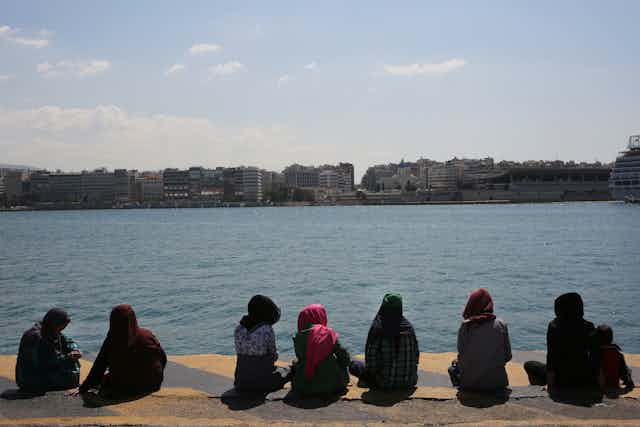In 2017, the Syrian refugee Abu Marwan killed his ex-wife on the streets in southern Germany in 2018 after she had obtained a divorce from him, was granted custody for her three children and married another man. Afterwards, he wrote on Facebook:
Ya niswan ya suriyat, hay nihayitkun: This is a message to all women who play with their husbands. This is the fate of every woman who thinks she can come to Europe, divorce her husband and take away his children.
Sexual and gender-based violence has become a phenomenon within refugee families. This violence is deeply rooted in power inequalities between women and men which is very often linked to socioeconomic responsibilities and religious obligations.
My own research indicates that the rupture caused by migration leads women to rethink and redefine their roles within their families. In their home countries – and in the cases of refugees from Syria and Iraq, before the outbreak of the civil wars in their home countries – they would not necessarily have worked outside of their homes. Now, they find themselves forced to work to care for their children.

One Syrian woman in the UK told me: “I am of a very well-off family. I had everything and I never had to work. Now I know if I do not work, my children will not have food on the table. Things changed.” Refugees have lost their homes, are forced to pay rent and cope with higher living expenses.
International humanitarian organisations and international NGOs support refugees but they tend to focus on women because they see it as their obligation to “rescue the suppressed Muslim woman”. The support is very often shaped by western perceptions and assumptions of the problems these refugees face. These organisations then implement their own desired solutions and interventions, which tend to be based on western liberal models.
This can be problematic because they lack understanding of – and sensitivity to – women’s lived realities. Changes in gender roles need to be gradually implemented in order to avoid sudden changes, as these can expose refugee women in particular to new forms of vulnerabilities, cause a breakdown of their marriages and – in extreme cases – to violence. Sustainability in gender role changes can only be achieved when programmes are developed towards the support of a particular group that consider their specific needs.

Before implementing any interventions, it is crucial to pay attention to the existing beliefs, ways of life and values of families. In order to avoid new forms of vulnerabilities, one needs to pay attention to people’s needs on the ground and use their own language, in a religiously and culturally sensitive way, if current values and norms around gender roles are to be successfully adapted for their new environment.
Shaking things up
I am currently investigating the impact of the refugee experience on marital relationships and family structures among both Iraqi and Syrian refugees. My research so far has shown that, as intended by these NGOs, these opportunities facilitate women’s economic empowerment and independence. This is obviously something to be welcomed.
But in doing so, they cause significant disruption on power relations within the family unit: in the past men were the main breadwinner of the family. Now in the refugee context, women are very often the only earners. Men on the other side are left with very little support in finding jobs, leaving them feeling disappointed, desperate and frustrated. This frustration negatively affects their marital relationship, leading to an increase in sexual and gender-based violence in certain extreme cases.

The change in women and men’s roles within the family is happening very rapidly. One refugee woman now living in Jordan told me: “The man is not a man anymore and the woman is not a woman anymore.” Some are able to accept these sudden changes to traditional gender roles and built a new lifestyle, but others are not able to cope with the new situation.
Men tend to be the ones who suffer most from this change. As one Syrian man in the UK asked me: “What is a man worth if he is not able to provide for this family? He is not a man.” Within refugee families in Jordan, for example, women have taken work opportunities that were traditionally preserved for men, such as going out in the early hours of the day to work in a bakery or working as a driver. Although this is positive and empowering, it leaves men without jobs.
Another way
This is not to suggest that women should not work or that men’s aggression and violence towards women is justified. But it is important to understand the roots of this aggression in order to tackle and find solutions for it.
Interventions by international organisations have provided women with economic independence. Yet, they have not taught either women or men how to deal with these sudden changes. One Iraqi woman in Germany, for example, explained to me: “I have my own money now and I have the whole world on my side because I am a woman. No man dares now to control me. He needs to follow what I say.”
Mutual recognition of responsibilities in the families as a form of partnership in which gender equality is at the centre needs to be learned, as one Syrian refugee women in the UK explains: “We need to move away from controlling each other. It is not about power. It is about sharing responsibilities.”

